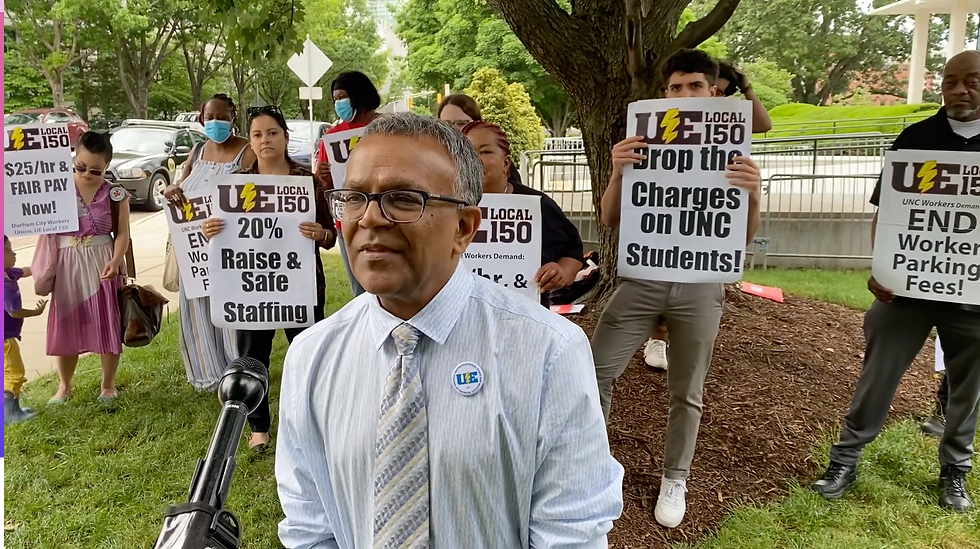
UE Local 150 members from the Department of Health and Human Services (DHHS) and the University of North Carolina (UNC) held a political action day at the state legislature on Thursday, May 16th to urge their representatives to take action to improve working conditions for public-sector workers around the state. Members gave speeches and chanted outside the capitol on the front lawn to call attention to their unlivable wages and working conditions.
“The staff shortages in DHHS are as bad as they have ever been,” said Sekia Royall, President of Local 150 and cook at the O’Berry Center in Goldsboro. “Each facility is looking at at least 30 percent vacancy rate across the state with the nursing staffing agency contracts expiring this summer workers are concerned that the vacancy rate will double.
“North Carolina has tried to temporarily fix our staff shortage by hiring temporary workers paying them twice the money that they pay long-term dedicated staff, and we are tired of it. Our demand for a $20 per hour minimum wage is necessary to keep up with the current inflation.”
DHHS has been working to address overlapping crises in North Carolina related to mental health and opioid addiction, while also dealing with a shortage of inpatient beds for patients with dementia and developmental disorders. In addition, the state legislature has not addressed the critical staffing shortages at the state’s 13 hospitals. UE Local 150 members said that continued inaction will lead to the loss of more inpatient hospital beds which provide critical services to their most vulnerable residents. The members have urged legislators to act because record vacancy rates are creating more difficult working conditions and stagnant salaries, which are not keeping up with the skyrocketing cost of housing and food.
“We know that our state has a $1.4 billion surplus and we want our legislative body to allocate those funds in a way that is consistent with our values,” said Rakesh Patel, a state DHHS worker from Central Regional Hospital. “We are asking for DHHS and the legislative body to appropriate more funds so we can have a 20 percent increase in our salaries or a $20 minimum wage."
“We also think there are issues that don’t involve money, which include assigning a safe staffing task force and addressing the chronic toxic workplace culture that we are seeing in our hospitals. State workers come to take care of these patients and we want to see them leave physically intact and emotionally intact.”
North Carolina is also set to be the first state to completely eliminate corporate income taxes, draining between $6 and 8 billion from critical public services and jobs. Local 150 members met with over a dozen legislators urging them to raise state workers’ salaries by 20 percent and institute a $20 minimum wage for state workers. They are calling for corporations pay their fair share of taxes, safe staffing, an end to toxic work environments, and a repeal of the ban on public sector collective bargaining in the state.
In recent weeks, Local 150 graduate worker members at UNC and NC State University have also been peacefully calling on their university to divest from the Israeli military, which is currently bombarding the people of Palestine. Administrations at the universities responded by violently attacking, arresting, and suspending students and graduate workers. This included UE Local 150’s UNC graduate worker co-chapter president Hashem Amireh, who is Palestinian, while peacefully protesting. The union is calling for the charges to be dropped and suspensions to be overturned. UNC union members are also calling for an end to parking and graduate worker fees which are paid by campus workers.
Videos from the rally and press conference can be seen on the UE Local 150 YouTube channel at https://www.youtube.com/@ue150ncpublicserviceworker5.
This article was published first by UE Local 150.

コメント